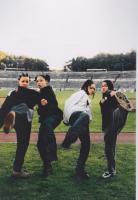 I think it was really a mixture from the beginning but black teenagers from all the African ex-colonies, marginalised people, recognised themselves in the lyrics of American groups that talked about racism and social injustice, which they experienced in the US.
But since the beginning, white kids that were in school with these black communities liked the music, the attitude, the aesthetic and began to rap. So, it was a mixture from the beginning. General D, the first rapper to release an album in Portugal has Mozambican origins, for example. Nelson Neves, who is an important person in the film, was the one who brought the music from Paris because he spent vacations there, and he's the son of Cape Verdean parents. In Rapública you have white artists like Líderes de Nova Mensagem, which was a band that had black and white musicians, rappers and DJs, and they're from Almada.
I think it was really a mixture from the beginning but black teenagers from all the African ex-colonies, marginalised people, recognised themselves in the lyrics of American groups that talked about racism and social injustice, which they experienced in the US.
But since the beginning, white kids that were in school with these black communities liked the music, the attitude, the aesthetic and began to rap. So, it was a mixture from the beginning. General D, the first rapper to release an album in Portugal has Mozambican origins, for example. Nelson Neves, who is an important person in the film, was the one who brought the music from Paris because he spent vacations there, and he's the son of Cape Verdean parents. In Rapública you have white artists like Líderes de Nova Mensagem, which was a band that had black and white musicians, rappers and DJs, and they're from Almada.
Face to face
13.07.2025 | by Graham Douglas
 He tells us about the important and complex mission that Amílcar Cabral delegated to them and what it was like to learn the crushing news of his assassination in the middle of this process. It fell to him as his first job to film Amílcar Cabral at an exhibition on the struggle in Conakry, in 1972, and then the transferring of his body to Bissau, capturing the commotion of the Guineans at the death of their greatest thinker and anti-colonial resistance leader.
He tells us about the important and complex mission that Amílcar Cabral delegated to them and what it was like to learn the crushing news of his assassination in the middle of this process. It fell to him as his first job to film Amílcar Cabral at an exhibition on the struggle in Conakry, in 1972, and then the transferring of his body to Bissau, capturing the commotion of the Guineans at the death of their greatest thinker and anti-colonial resistance leader.
Face to face
17.03.2025 | by Marta Lança
 Shot of Avenida Marginal: tourists walk along it for leasure, Cape Verdeans working. The accumulation of images creates a parallel view, of a world that interacts, but is mutually unaware of each other. We then begin to discover a reading line of the movie. The two worlds are presented to us in a certain manichaeism, famously assumed by the directors. On one side, the resilience of the islanders and their ability to take advantage of scarce resources. The struggling Cape Verdeans who resist the constraints that harass them, whose difficult lives are mitigated by interpersonal relationships of solidarity and some alienation.
Shot of Avenida Marginal: tourists walk along it for leasure, Cape Verdeans working. The accumulation of images creates a parallel view, of a world that interacts, but is mutually unaware of each other. We then begin to discover a reading line of the movie. The two worlds are presented to us in a certain manichaeism, famously assumed by the directors. On one side, the resilience of the islanders and their ability to take advantage of scarce resources. The struggling Cape Verdeans who resist the constraints that harass them, whose difficult lives are mitigated by interpersonal relationships of solidarity and some alienation.
Afroscreen
08.05.2024 | by Marta Lança
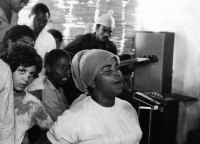 How a music shaped by slavery, epidemics, famine and mass migration travelled the world, narrating stories of suffering and resistance. Over time, morna, also known as “música rainha” (“queen music”), underwent several changes to its melodic and rhythmic characteristics, becoming the slower, more mournful version heard today. Characterised by three dimensions of melody, poetry and dance, morna is often sung in Kriolu, Portuguese-based Creole, though it can be instrumental, too.
How a music shaped by slavery, epidemics, famine and mass migration travelled the world, narrating stories of suffering and resistance. Over time, morna, also known as “música rainha” (“queen music”), underwent several changes to its melodic and rhythmic characteristics, becoming the slower, more mournful version heard today. Characterised by three dimensions of melody, poetry and dance, morna is often sung in Kriolu, Portuguese-based Creole, though it can be instrumental, too.
Stages
26.05.2021 | by Beatriz Ramalho da Silva
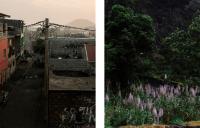 If images are powerful for identifying and revolutionising through the multiple interpretations they introduce into human feelings, then words identify through questioning, as they are connected to an idea of language as domination and authority – in other words, only those with social and political legitimacy write and speak.
If images are powerful for identifying and revolutionising through the multiple interpretations they introduce into human feelings, then words identify through questioning, as they are connected to an idea of language as domination and authority – in other words, only those with social and political legitimacy write and speak.
Afroscreen
15.11.2020 | by Marta Lança and Welket Bungué
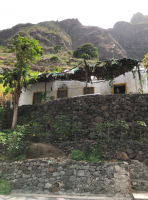 The present photo-essay is the result of recent fieldwork. On the islands, the inhabitants had to harness available resources (e.g., rain, soil, mountains and oceans) and follow a frugal but ingenious diet. Collectively, they triumphed over natural forces, western colonialism and deterministic forecasts.
The present photo-essay is the result of recent fieldwork. On the islands, the inhabitants had to harness available resources (e.g., rain, soil, mountains and oceans) and follow a frugal but ingenious diet. Collectively, they triumphed over natural forces, western colonialism and deterministic forecasts.
To read
13.09.2020 | by Kaian Lam
 brain drain is a problem. Emigration in Cape Verde is not a bed of roses. In fact, it has created a serious problem of brain drain. One common situation involves young students who decide to study abroad (in Portugal, for example) and do not return to Cape Verde after completion of their university education. According to data between 1997/98 and 2002/2003, about 77% of students (around 5,382) left the country and did not return.
brain drain is a problem. Emigration in Cape Verde is not a bed of roses. In fact, it has created a serious problem of brain drain. One common situation involves young students who decide to study abroad (in Portugal, for example) and do not return to Cape Verde after completion of their university education. According to data between 1997/98 and 2002/2003, about 77% of students (around 5,382) left the country and did not return.
To read
16.12.2018 | by Cláudia Rodrigues
 Cape Verde is not Africa, Cape Verdeans are “special blacks” and the closest to Portugal. Cape Verde is the country of miscegenation, the “proof” of “racial harmony” of Luso-Tropicalism. For many years, this was the dominant narrative. To be or not to be African continues to be a question.
Cape Verde is not Africa, Cape Verdeans are “special blacks” and the closest to Portugal. Cape Verde is the country of miscegenation, the “proof” of “racial harmony” of Luso-Tropicalism. For many years, this was the dominant narrative. To be or not to be African continues to be a question.
To read
04.12.2018 | by Joana Gorjão Henriques
 In Cape Verde, the sandwich is not making significant inroads. It continues to be foreign, prepared fresh and appreciated by tourists and in a restricted circle of young middle-class professionals. This must be understood within the social and economic context. The following discusses whether or not the sandwich stands a chance in the Atlantic. It looks at the history and current development of Cape Verde, focuses on food issues, and explores how the sandwich fits in.
In Cape Verde, the sandwich is not making significant inroads. It continues to be foreign, prepared fresh and appreciated by tourists and in a restricted circle of young middle-class professionals. This must be understood within the social and economic context. The following discusses whether or not the sandwich stands a chance in the Atlantic. It looks at the history and current development of Cape Verde, focuses on food issues, and explores how the sandwich fits in.
To read
24.11.2018 | by Kaian Lam
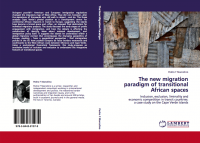 Pedro F. Marcelino has released a study on the new migratory paradigm emerging in post-9/11 Cape Verde. The study reflects a socio-economic context in which out-migration to traditional overseas destinations is no longer the only migratory phenomenon in the islands. The country has seen a steep increase in part- and full-time resident Europeans, as well as Chinese and continental African migrants. The research proposes that anti-terrorist measures and immigration control policies in both the USA and the EU after 9/11 have altered the migratory map of West Africa, whilst failing to curb people’s aspirations to depart and seek a better life.
Pedro F. Marcelino has released a study on the new migratory paradigm emerging in post-9/11 Cape Verde. The study reflects a socio-economic context in which out-migration to traditional overseas destinations is no longer the only migratory phenomenon in the islands. The country has seen a steep increase in part- and full-time resident Europeans, as well as Chinese and continental African migrants. The research proposes that anti-terrorist measures and immigration control policies in both the USA and the EU after 9/11 have altered the migratory map of West Africa, whilst failing to curb people’s aspirations to depart and seek a better life.
To read
16.09.2011 | by Pedro José-Marcellino aka P.J. Marcellino
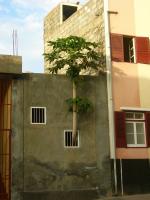 Body, consumption, sexuality, expression, festivity, communality and informality will be analyzed as the central places of the new challenges, negotiations and innovations of citizenship of contemporary young people in Cape Verde.
Body, consumption, sexuality, expression, festivity, communality and informality will be analyzed as the central places of the new challenges, negotiations and innovations of citizenship of contemporary young people in Cape Verde.
To read
01.05.2011 | by Filipe Martins
 I think it was really a mixture from the beginning but black teenagers from all the African ex-colonies, marginalised people, recognised themselves in the lyrics of American groups that talked about racism and social injustice, which they experienced in the US.
But since the beginning, white kids that were in school with these black communities liked the music, the attitude, the aesthetic and began to rap. So, it was a mixture from the beginning. General D, the first rapper to release an album in Portugal has Mozambican origins, for example. Nelson Neves, who is an important person in the film, was the one who brought the music from Paris because he spent vacations there, and he's the son of Cape Verdean parents. In Rapública you have white artists like Líderes de Nova Mensagem, which was a band that had black and white musicians, rappers and DJs, and they're from Almada.
I think it was really a mixture from the beginning but black teenagers from all the African ex-colonies, marginalised people, recognised themselves in the lyrics of American groups that talked about racism and social injustice, which they experienced in the US.
But since the beginning, white kids that were in school with these black communities liked the music, the attitude, the aesthetic and began to rap. So, it was a mixture from the beginning. General D, the first rapper to release an album in Portugal has Mozambican origins, for example. Nelson Neves, who is an important person in the film, was the one who brought the music from Paris because he spent vacations there, and he's the son of Cape Verdean parents. In Rapública you have white artists like Líderes de Nova Mensagem, which was a band that had black and white musicians, rappers and DJs, and they're from Almada.  He tells us about the important and complex mission that Amílcar Cabral delegated to them and what it was like to learn the crushing news of his assassination in the middle of this process. It fell to him as his first job to film Amílcar Cabral at an exhibition on the struggle in Conakry, in 1972, and then the transferring of his body to Bissau, capturing the commotion of the Guineans at the death of their greatest thinker and anti-colonial resistance leader.
He tells us about the important and complex mission that Amílcar Cabral delegated to them and what it was like to learn the crushing news of his assassination in the middle of this process. It fell to him as his first job to film Amílcar Cabral at an exhibition on the struggle in Conakry, in 1972, and then the transferring of his body to Bissau, capturing the commotion of the Guineans at the death of their greatest thinker and anti-colonial resistance leader.  Shot of Avenida Marginal: tourists walk along it for leasure, Cape Verdeans working. The accumulation of images creates a parallel view, of a world that interacts, but is mutually unaware of each other. We then begin to discover a reading line of the movie. The two worlds are presented to us in a certain manichaeism, famously assumed by the directors. On one side, the resilience of the islanders and their ability to take advantage of scarce resources. The struggling Cape Verdeans who resist the constraints that harass them, whose difficult lives are mitigated by interpersonal relationships of solidarity and some alienation.
Shot of Avenida Marginal: tourists walk along it for leasure, Cape Verdeans working. The accumulation of images creates a parallel view, of a world that interacts, but is mutually unaware of each other. We then begin to discover a reading line of the movie. The two worlds are presented to us in a certain manichaeism, famously assumed by the directors. On one side, the resilience of the islanders and their ability to take advantage of scarce resources. The struggling Cape Verdeans who resist the constraints that harass them, whose difficult lives are mitigated by interpersonal relationships of solidarity and some alienation.  How a music shaped by slavery, epidemics, famine and mass migration travelled the world, narrating stories of suffering and resistance. Over time, morna, also known as “música rainha” (“queen music”), underwent several changes to its melodic and rhythmic characteristics, becoming the slower, more mournful version heard today. Characterised by three dimensions of melody, poetry and dance, morna is often sung in Kriolu, Portuguese-based Creole, though it can be instrumental, too.
How a music shaped by slavery, epidemics, famine and mass migration travelled the world, narrating stories of suffering and resistance. Over time, morna, also known as “música rainha” (“queen music”), underwent several changes to its melodic and rhythmic characteristics, becoming the slower, more mournful version heard today. Characterised by three dimensions of melody, poetry and dance, morna is often sung in Kriolu, Portuguese-based Creole, though it can be instrumental, too.  If images are powerful for identifying and revolutionising through the multiple interpretations they introduce into human feelings, then words identify through questioning, as they are connected to an idea of language as domination and authority – in other words, only those with social and political legitimacy write and speak.
If images are powerful for identifying and revolutionising through the multiple interpretations they introduce into human feelings, then words identify through questioning, as they are connected to an idea of language as domination and authority – in other words, only those with social and political legitimacy write and speak.  The present photo-essay is the result of recent fieldwork. On the islands, the inhabitants had to harness available resources (e.g., rain, soil, mountains and oceans) and follow a frugal but ingenious diet. Collectively, they triumphed over natural forces, western colonialism and deterministic forecasts.
The present photo-essay is the result of recent fieldwork. On the islands, the inhabitants had to harness available resources (e.g., rain, soil, mountains and oceans) and follow a frugal but ingenious diet. Collectively, they triumphed over natural forces, western colonialism and deterministic forecasts.  brain drain is a problem. Emigration in Cape Verde is not a bed of roses. In fact, it has created a serious problem of brain drain. One common situation involves young students who decide to study abroad (in Portugal, for example) and do not return to Cape Verde after completion of their university education. According to data between 1997/98 and 2002/2003, about 77% of students (around 5,382) left the country and did not return.
brain drain is a problem. Emigration in Cape Verde is not a bed of roses. In fact, it has created a serious problem of brain drain. One common situation involves young students who decide to study abroad (in Portugal, for example) and do not return to Cape Verde after completion of their university education. According to data between 1997/98 and 2002/2003, about 77% of students (around 5,382) left the country and did not return.  Cape Verde is not Africa, Cape Verdeans are “special blacks” and the closest to Portugal. Cape Verde is the country of miscegenation, the “proof” of “racial harmony” of Luso-Tropicalism. For many years, this was the dominant narrative. To be or not to be African continues to be a question.
Cape Verde is not Africa, Cape Verdeans are “special blacks” and the closest to Portugal. Cape Verde is the country of miscegenation, the “proof” of “racial harmony” of Luso-Tropicalism. For many years, this was the dominant narrative. To be or not to be African continues to be a question.  In Cape Verde, the sandwich is not making significant inroads. It continues to be foreign, prepared fresh and appreciated by tourists and in a restricted circle of young middle-class professionals. This must be understood within the social and economic context. The following discusses whether or not the sandwich stands a chance in the Atlantic. It looks at the history and current development of Cape Verde, focuses on food issues, and explores how the sandwich fits in.
In Cape Verde, the sandwich is not making significant inroads. It continues to be foreign, prepared fresh and appreciated by tourists and in a restricted circle of young middle-class professionals. This must be understood within the social and economic context. The following discusses whether or not the sandwich stands a chance in the Atlantic. It looks at the history and current development of Cape Verde, focuses on food issues, and explores how the sandwich fits in.  Pedro F. Marcelino has released a study on the new migratory paradigm emerging in post-9/11 Cape Verde. The study reflects a socio-economic context in which out-migration to traditional overseas destinations is no longer the only migratory phenomenon in the islands. The country has seen a steep increase in part- and full-time resident Europeans, as well as Chinese and continental African migrants. The research proposes that anti-terrorist measures and immigration control policies in both the USA and the EU after 9/11 have altered the migratory map of West Africa, whilst failing to curb people’s aspirations to depart and seek a better life.
Pedro F. Marcelino has released a study on the new migratory paradigm emerging in post-9/11 Cape Verde. The study reflects a socio-economic context in which out-migration to traditional overseas destinations is no longer the only migratory phenomenon in the islands. The country has seen a steep increase in part- and full-time resident Europeans, as well as Chinese and continental African migrants. The research proposes that anti-terrorist measures and immigration control policies in both the USA and the EU after 9/11 have altered the migratory map of West Africa, whilst failing to curb people’s aspirations to depart and seek a better life.  Body, consumption, sexuality, expression, festivity, communality and informality will be analyzed as the central places of the new challenges, negotiations and innovations of citizenship of contemporary young people in Cape Verde.
Body, consumption, sexuality, expression, festivity, communality and informality will be analyzed as the central places of the new challenges, negotiations and innovations of citizenship of contemporary young people in Cape Verde. 